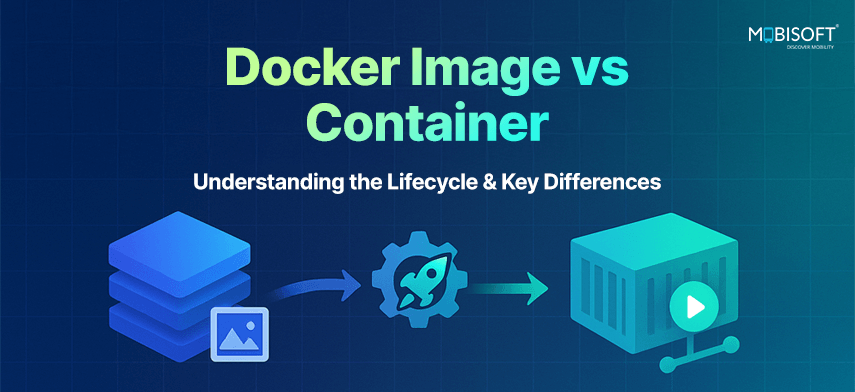Docker Image vs Container: Understanding the Lifecycle & Key Differences

Docker is an open-source platform that helps streamline work for developers. It gives teams a practical way to build, move, and run applications with containerization. Over time, it has become one of those tools you expect to find in any modern software project. Deployments go faster, and the whole system runs smoothly.
The changes in how we build, ship, and manage applications since Docker came out are huge. Many beginners struggle to distinguish between a docker image and a docker container.
Let’s break that down together, talk through how these pieces connect, and take a look at what each one does during the container lifecycle when it’s time to get your app running.
If you’re looking to streamline development and deployment pipelines, explore our devOps services for docker and CI/CD

Docker Images vs. Containers Flowchart
Prerequisites
Basic Understanding of Virtualization
Picture virtualization as running several “computers” inside one physical machine. It’s a helpful starting point. docker containers are similar, just lighter and less resource-hungry. Instead of spinning up full virtual machines, containers share parts of the machine’s system to operate apps independently.
Familiarity with Command-Line Interfaces
You’ll need to use the terminal, a black window where you type Docker container commands. If you know how to switch folders or run a basic script, you’re already set to move through the process more easily.
Docker Installed
To follow along, docker needs to be set up on your device. It’s available for Windows, Mac, and Linux. You can grab the installer from Docker’s official site.
Basic Knowledge of Containers
Knowing what a container is always helps. Think of it as a lightweight, self-contained package for apps. If you’ve bumped into Kubernetes before, you’re halfway there. Kubernetes exists to manage lots of containers across their lifecycle states.
You can also hire docker consultants for container strategy and lifecycle management to optimize your workflows

What is a Docker Image?
A docker image acts like a starter kit for software. It’s a lightweight, standalone file that has everything an app needs: the application code, the required dependencies like libraries, runtime, system tools, frameworks, plus any custom settings packed inside.
Once you build an image, it’s read-only. You can’t change it without building a new one. In practice, it’s your template,something you “stamp out” docker containers from, over and over.
Key Characteristics of Docker Images
- Immutable: Once built, an image remains unchanged. Any modification requires creating a new image.
- Portable: Can be shared and deployed across different environments.
- Layered Structure: Built using a layered file system that optimizes storage and reuses common layers.
- Versioned: Each image can be tagged with different versions (e.g., nginx:1.21, python:3.9).
- Reusable: You can share and reuse images across different environments. They are typically stored in a Docker registry like Docker Hub, where you can pull public images or push your own.
What is a Docker Container?
A Docker container comes to life when an image runs. Think of the image as a recipe, and the container as the chef working live in its own kitchen.
A container starts as an image, but once it’s running, it becomes a secluded space for your app. Each container runs independently. It happens when sharing the host’s kernel; this keeps things light and quick.
When you launch an app in a container, Docker creates a sandboxed environment where everything operates separately from the rest of your system. Containers are flexible, as they include a writable layer. So, data can change how your app runs and adapt on the fly throughout the container lifecycle.
Key Characteristics of Docker Containers
Ephemeral by Default
Stop or delete a container, and you lose what’s inside, but the image remains untouched.
Isolated
Every container gets its own space to run, but you can let them talk to each other if that’s needed.
Lightweight
Since they share the host’s kernel, containers use a lot less overhead than old-school virtual machines.
Configurable
Change containers with different environment settings, adjust their networks, or attach storage; each container can be set up the way you need.
Learn more about docker container monitoring with prometheus and grafana for real-time insights
Relationship Between Docker Images and Containers
Docker Images as Templates
A Docker image is a read-only template that needs code, libraries, dependencies, and environment variables. It acts as a blueprint for creating containers.
Containers as Live Instances
When you run an image with the docker run command, it creates a container. It runs the app from that image and maintains its own isolated environment.
Multiple Containers from One Image
You can launch many containers from one image. Each container runs independently, even though they share the same base image. This runs identical apps with different configurations.
Additional Details
Layered Architecture
Docker builds images in layers. Each layer records a change, such as installing a package or adding a file. These layers remain cached, so Docker can reuse them. This reduces storage use and speeds up image build and push/pull processes. When a container starts, it adds a writable layer on top so changes can occur while it runs.
Immutability of Images
Once you build an image, you cannot change it directly. To modify it, you need to create a new one. You can do this by adjusting a container and committing changes to the dockerfile before rebuilding.
Reusability and Efficiency
Thanks to the layered structure, docker images are highly efficient. Shared layers minimize redundancy, speed up deployment, and support multiple containers across different lifecycle stages.
Read More: https://mobisoftinfotech.com/resources/blog/devops/docker-image-vs-container-lifecycle
- AI
- Vitamins
- Health
- Admin/office jobs
- News
- Art
- Causes
- Crafts
- Dance
- Drinks
- Film
- Fitness
- Food
- Παιχνίδια
- Gardening
- Health
- Κεντρική Σελίδα
- Literature
- Music
- Networking
- άλλο
- Party
- Religion
- Shopping
- Sports
- Theater
- Wellness


